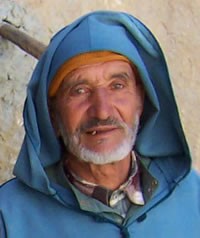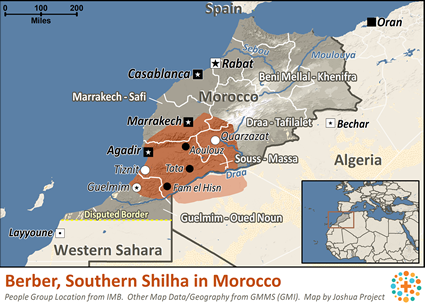The Southern Shilha (also known as the Sousi Berbers) live in the western High Atlas and the Anti Atlas Mountains of southwestern Morocco. They also live in the plains and valleys which lie between them.
Most parts of the mountains are well watered, and between November and May the region is blanketed in snow. Vegetation is almost non-existent along the southern slopes. But wherever they live, a majority of the Shilha raise crops and livestock. (The varieties and breeds depend on local conditions of the climate and soil.)
The people live in villages of all sizes, using the limited soil and water resources with care. They build small dams and cultivate terraces where cereals and other crops are grown.
The Southern Shilha are a poor but proud people. They are tough and hardworking, scratching out a meager existence in a part of the world that is physically antagonistic to an agricultural society.
No other group in Morocco, starting from tribal origins, has achieved as much as the Southern Shilha. They have excelled in business, in sports, music and in politics. A high degree of unity is the key to their success. This unity extends beyond tribal boundaries to encompass all who speak Tachelhit, their native language.
Most of the Shilha are farmers and shepherds. On the plots of ground that are not regularly irrigated, they grow barley and sometimes rye. On the lower slopes, they herd sheep and goats. Surplus farm and animal products are sold at weekly markets.
In the villages, the Berber way of life has remained unchanged over the centuries. Most Shilha villages contain between 50 and 500 people. They typically live in two-story, mud brick homes with flat roofs. In the more rugged mountain areas, they live in sturdy goat skin tents.
Urban men and women wear western clothing, sometimes with long hooded robes, or jellabas, over them. Men wear turbans, or skull caps, called tagiyas, and women wear veils or head scarves. Rural women dress colorfully but modestly, wearing several layers of clothing.
A typical family consists of close relatives living under the authority of the male head of the family. A new bride, sometimes as young as 14, will move into the home of the husband's family after marriage.
Since the late 19th century, many Shilha have left their poor, overpopulated valleys in hopes of finding new resources in the northern cities of Morocco. Some have become profitable grocers, shopkeepers, or wholesalers. Others have entered the fabric trade. Today, some of the most important businessmen in Casablanca are Shilha.
Although the Shilha are nearly all Sunni Muslims, their religion is mingled with spiritism and mysticism. Most villages contain a shrine for their particular "saint." People often visit these domed buildings in search of healing. This blended religion has created in them a curiosity and yearning to know more about their god. They worship a god whom they believe wants to be present in their daily lives. Such a spiritual climate is ripe for a presentation of the gospel. Who will go to them?
In rural areas, only about half of the people have access to health services. These facilities usually only consist of a small clinic with a nurse, but no doctor.
Pray for the Lord to call his children to help the Southern Shilha Berbers with their medical needs.
Ask God to raise up those willing to go to Morocco as tentmakers.
Pray that God will encourage the small number of Shilha believers and use them to disciple others.
Ask the Holy Spirit to stir a hunger in the Southern Shilha people to have a personal relationship with the only savior, Jesus Christ.
Pray for the Lord to give dreams of the risen and victorious Christ to Shilha elders.
Scripture Prayers for the Berber, Southern Shilha in Morocco.
https://en.wikipedia.org/wiki/Shilha_people
https://www.gateway-africa.com/tribe/Shilha_Berbers_tribe.html
| Profile Source: Joshua Project |


























